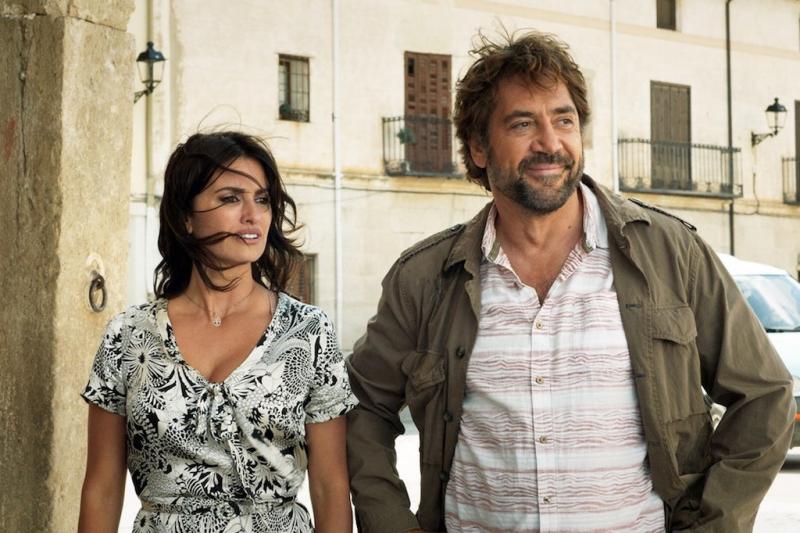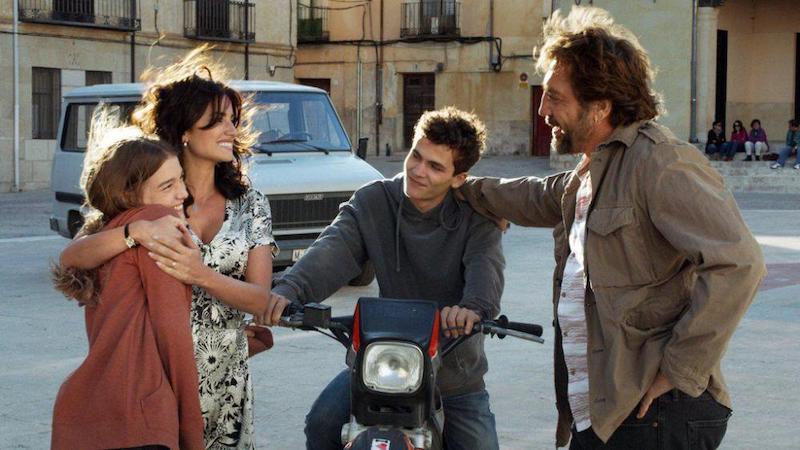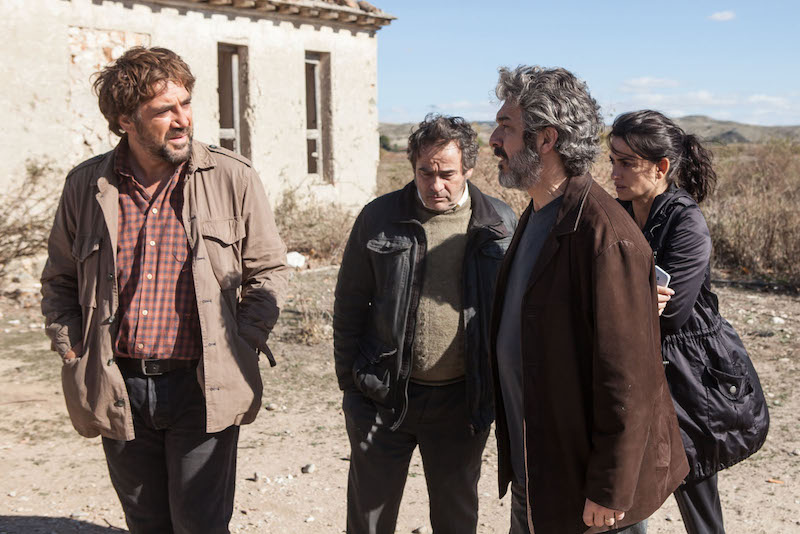Everybody Knows review - so-so Spanish kidnap drama | reviews, news & interviews
Everybody Knows review - so-so Spanish kidnap drama
Everybody Knows review - so-so Spanish kidnap drama
Cruz and Bardem excel as ex-lovers whose past comes back to haunt them

It’s a parental nightmare that’s virtually impossible to comprehend – a missing child. But however disturbing, that dilemma is not the chief concern of the Iranian writer/director Ashgar Farhadi’s latest drama. As ever, he’s interested in the psychological scars and relationship fault-lines that a crime or misdeed can expose.
Farhadi is a master at building tension from moral dilemmas, behavioural detail, awkward family relations that are complicated by the past, by secrets, by lies. He’s won two foreign language Oscars, for A Separation and The Salesman, both set in his own country. When he first ventured abroad, with the French-based The Past, he lost none of his ability to stretch a domestic scenario to a thriller’s tautness.
But despite terrific performances by Penélope Cruz and Javier Bardem, Everybody Knows loses its way in its rural Spanish setting. Farhadi has set a high bar for himself, and this one falls just a little short.
Laura (Cruz) has returned to the Spanish village in which grew up, for her younger sister’s marriage. She has her two children in tow – the teenage Irene and younger brother – while her Argentine husband Alejandro (Ricardo Darín) has remained in their home in Buenos Aires, supposedly for business.
 The film starts with an irritating blast of Spanish overkill. Laura and the kids are welcomed by their bewilderingly extended family – parents, siblings and in-laws, cousins, and friends who are so intimate that they could be mistaken for family, including the bear-like and ebullient vineyard owner Paco (Jarvier Bardem), who also happens to be Laura's old flame. It’s difficult to be sure of who’s who and what’s what in the melee. And when watching these people energetically prepare for the wedding, then dive full pelt into the festivities – with too much energy, too much volume, too much kitsch bonhomie – it’s quite unbearable.
The film starts with an irritating blast of Spanish overkill. Laura and the kids are welcomed by their bewilderingly extended family – parents, siblings and in-laws, cousins, and friends who are so intimate that they could be mistaken for family, including the bear-like and ebullient vineyard owner Paco (Jarvier Bardem), who also happens to be Laura's old flame. It’s difficult to be sure of who’s who and what’s what in the melee. And when watching these people energetically prepare for the wedding, then dive full pelt into the festivities – with too much energy, too much volume, too much kitsch bonhomie – it’s quite unbearable.
I suspect that this is deliberate, at least in part, a tactic to distract all concerned – those on screen by the fun they’re having, we in the audience by the sheer sensory overload. And then, with the party in full swing, Farhadi springs his surprise.
The spoiler is unfortunate but necessary; in any case, Irene's eventual abduction has been highlighted by the very opening shot, of gloved hands arranging newspaper cuttings relating to an earlier kidnapping. Now, it’s the turn of Laura's family to go through the same hell.
The transition from a family gathering of Mamma Mia levels of high spirits to blind panic and despair is the film's standout sequence. As Laura and Paco launch themselves into the torrential rain to search for the girl, Cruz and Bardem (real-life partners and serial collaborators) are spectacularly good, she a rising tide of desperate emotion, he revealing the dependability and resolve beneath the party animal.
 Suddenly the film has become more than a confection; hereon, it’s both a mystery and a psychological thriller. Once suspicion has passed over the usual suspects targeted by prejudice (delinquent kids, grape pickers), it lands on those closest to home – fuelled by old grudges, rumours and conjecture, all twisted by the gulf between what everybody thinks they know about the past, and real secrets yet to be revealed. And as tempers fly, Irene’s life hangs in the balance.
Suddenly the film has become more than a confection; hereon, it’s both a mystery and a psychological thriller. Once suspicion has passed over the usual suspects targeted by prejudice (delinquent kids, grape pickers), it lands on those closest to home – fuelled by old grudges, rumours and conjecture, all twisted by the gulf between what everybody thinks they know about the past, and real secrets yet to be revealed. And as tempers fly, Irene’s life hangs in the balance.
There should be more than enough here for a rollicking ride and an interestingly fraught family drama. And frankly, I could watch Bardem all day when he’s in this sort of form – the actor utterly authentic and compelling as Paco ducks and dives and does everything he can to save the girl.
And yet Farhadi never quite gets it to gel. It takes a while to recover from the horrendous first half hour; the gripes about land ownership that see the family gang up against Paco don’t feel authentic; the important relationship between Paco and his wife Bea (Bárbara Lennie) is under-developed; despite Darín’s reliable turn (pictured above, right, with Bardem, Eduard Fernández and Cruz), his character's faith in God to sort out the ransom is simply annoying; and by the time Farhadi ends yet another of his films with a double barrel – a reveal, followed by an off-screen moral decision – there’s the sense that he’s painting by numbers.
Usually this director's nuanced storytelling justifies, or gives logical context to the sour taste of his endings and the cynicism of his world view. But the strong sense, here, that both Irene and the noble Paco deserve a different fate (and altogether different friends and family) suggests a failure to achieve a similarly satisfying denouement.
The future of Arts Journalism
You can stop theartsdesk.com closing!
We urgently need financing to survive. Our fundraising drive has thus far raised £49,000 but we need to reach £100,000 or we will be forced to close. Please contribute here: https://gofund.me/c3f6033d
And if you can forward this information to anyone who might assist, we’d be grateful.

Subscribe to theartsdesk.com
Thank you for continuing to read our work on theartsdesk.com. For unlimited access to every article in its entirety, including our archive of more than 15,000 pieces, we're asking for £5 per month or £40 per year. We feel it's a very good deal, and hope you do too.
To take a subscription now simply click here.
And if you're looking for that extra gift for a friend or family member, why not treat them to a theartsdesk.com gift subscription?
more Film
 Die My Love review - good lovin' gone bad
A magnetic Jennifer Lawrence dominates Lynne Ramsay's dark psychological drama
Die My Love review - good lovin' gone bad
A magnetic Jennifer Lawrence dominates Lynne Ramsay's dark psychological drama
 Bugonia review - Yorgos Lanthimos on aliens, bees and conspiracy theories
Emma Stone and Jesse Plemons excel in a marvellously deranged black comedy
Bugonia review - Yorgos Lanthimos on aliens, bees and conspiracy theories
Emma Stone and Jesse Plemons excel in a marvellously deranged black comedy
 theartsdesk Q&A: director Kelly Reichardt on 'The Mastermind' and reliving the 1970s
The independent filmmaker discusses her intimate heist movie
theartsdesk Q&A: director Kelly Reichardt on 'The Mastermind' and reliving the 1970s
The independent filmmaker discusses her intimate heist movie
 Blu-ray: Wendy and Lucy
Down-and-out in rural Oregon: Kelly Reichardt's third feature packs a huge punch
Blu-ray: Wendy and Lucy
Down-and-out in rural Oregon: Kelly Reichardt's third feature packs a huge punch
 The Mastermind review - another slim but nourishing slice of Americana from Kelly Reichardt
Josh O'Connor is perfect casting as a cocky middle-class American adrift in the 1970s
The Mastermind review - another slim but nourishing slice of Americana from Kelly Reichardt
Josh O'Connor is perfect casting as a cocky middle-class American adrift in the 1970s
 Springsteen: Deliver Me From Nowhere review - the story of the Boss who isn't boss of his own head
A brooding trip on the Bruce Springsteen highway of hard knocks
Springsteen: Deliver Me From Nowhere review - the story of the Boss who isn't boss of his own head
A brooding trip on the Bruce Springsteen highway of hard knocks
 The Perfect Neighbor, Netflix review - Florida found-footage documentary is a harrowing watch
Sundance winner chronicles a death that should have been prevented
The Perfect Neighbor, Netflix review - Florida found-footage documentary is a harrowing watch
Sundance winner chronicles a death that should have been prevented
 Blu-ray: Le Quai des Brumes
Love twinkles in the gloom of Marcel Carné’s fogbound French poetic realist classic
Blu-ray: Le Quai des Brumes
Love twinkles in the gloom of Marcel Carné’s fogbound French poetic realist classic
 Frankenstein review - the Prometheus of the charnel house
Guillermo del Toro is fitfully inspired, but often lost in long-held ambitions
Frankenstein review - the Prometheus of the charnel house
Guillermo del Toro is fitfully inspired, but often lost in long-held ambitions
 London Film Festival 2025 - a Korean masterclass in black comedy and a Camus classic effectively realised
New films from Park Chan-wook, Gianfranco Rosi, François Ozon, Ildikó Enyedi and more
London Film Festival 2025 - a Korean masterclass in black comedy and a Camus classic effectively realised
New films from Park Chan-wook, Gianfranco Rosi, François Ozon, Ildikó Enyedi and more
 After the Hunt review - muddled #MeToo provocation
Julia Roberts excels despite misfiring drama
After the Hunt review - muddled #MeToo provocation
Julia Roberts excels despite misfiring drama
 Ballad of a Small Player review - Colin Farrell's all in as a gambler down on his luck
Conclave director Edward Berger swaps the Vatican for Asia's sin city
Ballad of a Small Player review - Colin Farrell's all in as a gambler down on his luck
Conclave director Edward Berger swaps the Vatican for Asia's sin city

Add comment